Melbourne protesters test positive for Covid; Suspected Omicron case tests negative
Genomic sequencing has confirmed a recently returned traveller suspected of having the Omicron is not carrying the strain.
Coronavirus
Don't miss out on the headlines from Coronavirus. Followed categories will be added to My News.
• This coronavirus article is unlocked and free to read in the interest of community health and safety. Tap here for our latest great value offer and instantly access trusted news from the Herald Sun and Leader.
Nineteen people who attended freedom rally protests earlier this month have tested positive, with one of the infections in hospital.
The Department of Health has confirmed that investigations into the positive cases are ongoing, but it’s believed that at least nine were infectious while at the protests.
It comes as genomic sequencing confirmed a recently returned traveller who visited Victoria from NSW is not carrying the Omicron variant.
Meanwhile, Victoria recorded 1007 new Covid cases and three deaths overnight.
Senior Andrews government Minister Jacinta Allan on Monday said it was “too speculative” to confirm whether Victoria would shut its borders to New South Wales amid the Omicron threat.
Ms Allan on Tuesday said health authorities had been “working throughout the night” to determine future steps.
It comes as NSW Premier Dominic Perrottet said there may be a third case of the Omicron coronavirus variant in the state.
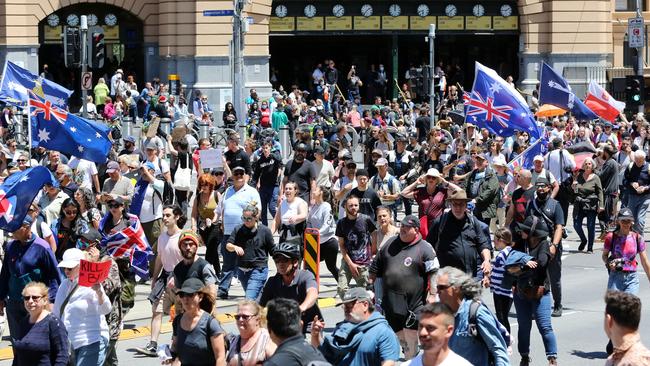
Two passengers from South Africa who arrived in Sydney on Saturday night have tested positive for the Omicron strain, which has officials working around the clock to understand its high transmissibility and what it means for vaccine efficacy.
At least 40 travellers who have landed in Australia from nine African countries of concern in recent weeks are in Victoria and will have to isolate for 14 days.
Ms Allan said the Omicron emergence highlighted the need for modern pandemic legislation to be passed through the parliament.
“This legislation, in some ways, is more important than ever,” she said.
“Those negotiations are continuing are likely to continue for the next couple of days.”
But she added: “I wouldn’t interpret anything in the timelines of the comments and negotiations will continue for as long as they need to.”
Ms Allan would not say whether it was the government’s preference to return to parliament this year for an added sitting day, or extend the state of emergency until next year, if negotiations aren’t landed on.
She also refused to be drawn on whether specific amendments — like health orders being disallowed by the parliament — had been agreed upon.
“I’m not in a position to be able to confirm those details,” she said.
14 DAYS’ QUARANTINE FOR CLOSE CONTACTS
A fully vaccinated man who has been identified as a close contact of the suspected Omicron variant has slammed the Department of Health’s “opaque” messaging.
Sali Miftari has been plunged into a 14-day forced quarantine stint after presumably coming into contact with the case at Melbourne Airport’s Qantas Business Lounge last Thursday.
Mr Miftari, who resides in Canberra, returned to Melbourne on Saturday, where he remains as he waits for further direction.
“I feel perfectly fine, but have no clothing or items to keep me occupied. I would like to go back to my home immediately,” he said.
Mr Miftari said the lengthy isolation order imposed on him was not warranted because at the time he was wearing a mask, socially distanced from others and only spent 13 minutes in the lounge.
“It is highly unlikely that I would have been in close proximity to the potential case nor near them long enough to have been infected,” he told the Herald Sun.
Mr Miftari said the resumption of two week isolation orders was “deeply frustrating”.
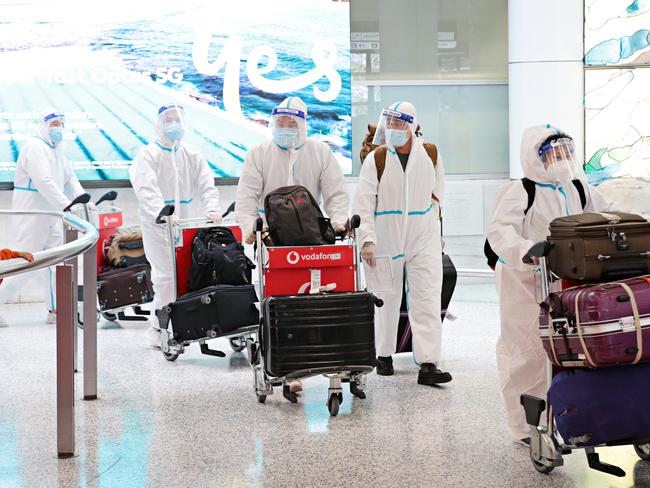
“I have been in the community in that time, have been fully vaccinated since September,” he said.
“The department has been so opaque and unforthcoming with information. This should worry everyone heading into Christmas.
“I’m fortunate as I can work from home but what about everyone else? Is this how it’ll be every time an Omicron case is confirmed?”
The Department of Health on Thursday confirmed it had told close contacts of the suspected Omicron case to isolate for fourteen days, while other casual contacts must now get negative results.
No exposure sites have yet been declared but more work is underway which is expected to discover more contacts.
Authorities are still waiting for tests to confirm whether the person has Omicron or another Covid strain.
If they are cleared of the variant, close contacts may be released from isolation.
The case was fully vaccinated and travelled from New South Wales to Victoria and then back again while infectious and asymptomatic.
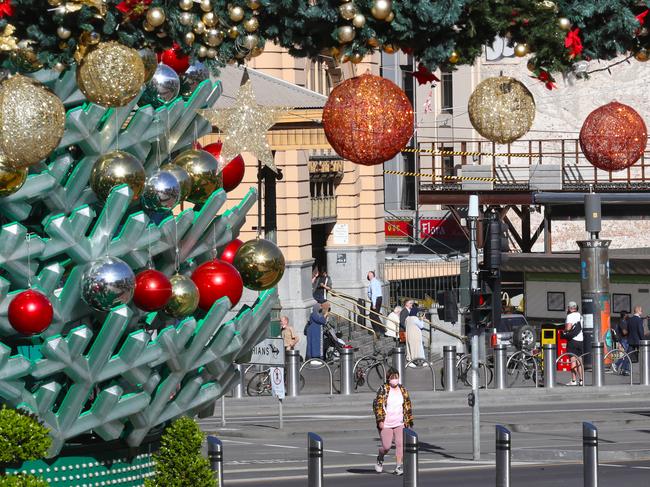
When the health department downgraded isolation requirements earlier this month, it had flagged some people would be required to self-isolate for two weeks in exceptional circumstances.
“The Department of Health will continue to manage emerging outbreaks of concern and ‘superspreader events’ and can impose a quarantine period on contacts on a case-by-case basis, depending on evidence,” a department spokesman said.
Opposition leader Matthew Guy said Victorians desperately needed certainty in the lead up to Christmas.
“The language and the politics of fear which have engulfed much of Covid, particularly here in Victoria, should be a thing of the past,” he added.
“Victorians have endured so much over the last two years, the last thing we want is the 14th new strain of coronavirus being used by any government, particularly our state government, to peddle in the politics of Covid and the politics of fear,” Mr Guy said.
“We want to have certainty that our Christmas, our summer, can be enjoyed peacefully, at home, around our friends and with our family. That’s what Victorians have earnt (and) that’s what they should get.”
Mr Guy said Victorians had done everything asked of them by getting vaccinated, adding that he would have built a quarantine facility earlier, if he was in government.
RESTRICTIONS THAT COULD RETURN
Concerns are increasing over the threat of the Omicron variant, but an infectious diseases expert says it is important that health authorities don’t make “panicked” decisions.
Infectious diseases physician and microbiologist Professor Peter Collignon said the time for lockdowns was over.
“It’s not sustainable to do this for another four or five years,” he told 3AW.
“Lockdowns, and some of the restrictions in retrospect, were overdone. The severe lockdowns didn’t necessarily give any better results than milder ones.”
Professor Collignon instead said some restrictions, such as a reintroduction to home visitor caps and indoor density limits, could be brought back during future outbreaks.
“That’s different to lockdowns. There are a number of restrictions we can do if (the virus) is going out of control or (we’re getting) bigger numbers than we’re expecting, but that’s not a lockdown,” he added.
Professor Collignon said he was still hopeful that Victoria was on track for a good summer.
“We’re in a good position, in my view, come December,” he said.
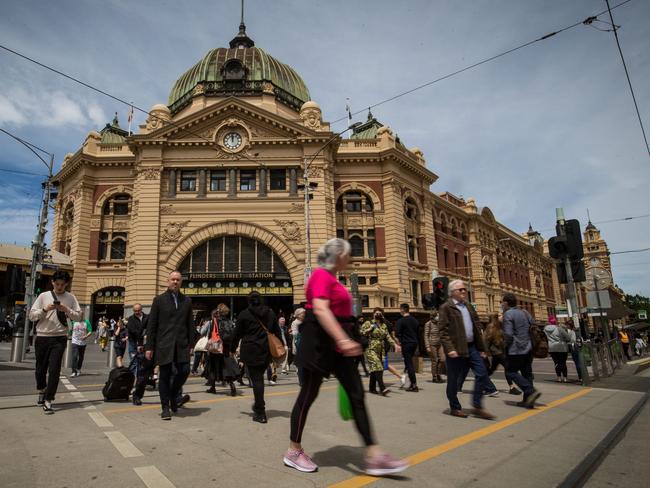
“The reality is, around Australia, our winters are milder than most of Europe, so it’s not a surprise that the more you’ve got a severe winter, the more you’re indoors in crowded facilities, the more you’ll get spread.”
Meanwhile, a South African doctor who was one of the first to raise the alarm about patients with the Omicron variant says the next seven to 14 days are critical in knowing the severity of the new strain.
Chair of South African Medical Association, Dr Angelique Coetzee, told 3AW the variant “might be more infectious” but patients currently infected are only presenting with mild symptoms.
Dr Coetzee said common symptoms of the new strain included “extreme exhaustion” that lasts about seven days, body aches and pains, a scratch in the throat and a dry cough.
Dr Coetzee said existing vaccines seem to provide some level of protection against the new variant.
“We haven’t seen any severe diseases so … for now it seems as if it might protect you but again, it’s very early,” she said.
“What is going to happen … that picture will only emerge within the next seven to 14 days max … there are no easy answers.”
THIRD OMICRON CASE CONFIRMED
The Northern Territory has recorded its first case of the Omicron variant.
A repatriated Australian who travelled to Darwin from South Africa has the strain, Health Minister Natasha Fyles confirmed on Monday.
She said there was no risk to the community, with the man travelling straight into the Centre for National Resilience upon his arrival.
Prime Minister Scott Morrison on Sunday backed Victoria’s decision to impose a 72-hour isolation period for all international arrivals as “sensible”.
“This is a fast-moving issue, but we will continue, as we always have, sensible, balanced, guided by the best possible medical evidence and medical expert advice,” Mr Morrison said.
But he also called for calm, saying that Australia’s goal was to “remain safely open” as fears mount over border closures in the lead-up to Christmas holidays.
The reopening of Australia’s border on December 1 to international students and skilled migrants will be reviewed, with Mr Morrison saying the government’s national security committee would consider the issue on Monday afternoon.
Asked if Victoria and NSW should reinstate the 14-day quarantine period for overseas arrivals, Mr Morrison said they would review the 72-hour period in place as more information came to hand, but that it was currently “a bit too early” to go further.
“We have had many variants of concerns,” he said.
“It’s important we calmly and carefully consider this information, work together and take the decisions that are necessary.”
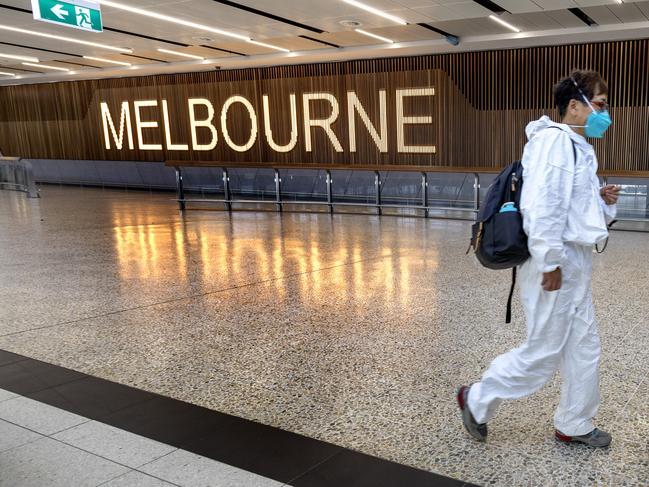
CALL FOR BOOSTER SHOTS PUSH
Health experts want booster shots to be given earlier as cases of the “concerning” Omicron variant are confirmed in Australia.
Virus specialist Professor Tony Blakely said bringing forward plans for a third vaccine dose could protect against the new strain if it appeared to spread more quickly.
“The waning of Pfizer and AstraZeneca is quite profound by six months, so you can make the case to bring it forward to five months,” he said.
Health Minister Greg Hunt said he had asked the national expert immunisation panel to review the recommended timing for booster vaccine doses in light of the emergence of the new variant.
“If they recommend changes, we will follow those changes,” he said.
Epidemiologists told the Herald Sun that existing vaccines might need to be tweaked and new vaccines delivered if the Covid-19 Omicron variant spread rapidly in Australia.
Professor Blakely said the next few weeks would be crucial in understanding how resistant the variant was to current vaccines.
“It’s quite likely that this will precipitate new branches of vaccine development, there’s just so many mutations on this virus it would seem most likely we will need new vaccines,” he said.
Professor Blakely said if the variant was more infectious, he hoped it would be less deadly, which would replace Delta as the dominant strain and be “easier” to live with.
“Whether that’s the case or not, we won’t know for a while,” he said.
“The worst-case scenario is it’s more infectious, it’s more virulent and it’s resistant to current vaccines.”
A third booster dose of current vaccines could also be brought forward to combat waning immunity and better prepare for next winter.
More than 1.5 million Australians are due for booster shots by Christmas Day, mainly frontline workers and people in high-risk groups, including those with a disability.
By January, 2.5 million will need to book their booster, before it climbs to 3.25 million in February and four million in both March and April.
Australia will be able to order vaccines being developed to tackle new Covid strains, such as the concerning Omicron variant, under its existing deals with Pfizer and Moderna.
A federal Health Department spokesman has confirmed that the federal government’s existing contracts with Pfizer and Moderna include “purchasing vaccines developed which may be effective against variants”.
He said the government was in “regular contact” with the pharmaceutical companies about vaccine supply and new variants of concern.
BioNTech, which developed a vaccine with Pfizer, has claimed it could produce and ship a modified vaccine that could combat Omicron within 100 days.
Co-chair of Australia’s expert immunisation panel, Professor Allen Cheng, said a new variant vaccine would have to go through an approvals process.
“I suspect that the hurdles to getting vaccines into arms would be less about doing the studies and the regulatory side than actually having the supply,” Professor Cheng said.
But Professor Cheng said that it was premature to know if reducing the six-month interval between second shot and booster would provide greater protection because it was untested.
“We need more data to know if that is going to be a successful strategy,” he said.
Former World Health Organisation epidemiologist Adrian Esterman said current vaccines would likely give “some protection” against Omicron, but nowhere near as much compared with the original strain.
He said new vaccine technologies had made it easier to modify existing formulas.
He said the Omicron variant highlighted the need for purpose-built quarantine hubs, such as Mickleham, to be prioritised.
Victoria’s chief health officer Brett Sutton said the variant would be “impossible to keep out” and would likely become the new dominant strain.
Professor Sutton reassured Victorians that they were “not back at square one”, adding travel restrictions would “buy time” while authorities determined the next steps.
The chief health officer said the Omicron variant was likely to be in dozens of countries and was a consequence of vaccination coverage in Africa being “in single figures”.
Health Minister Martin Foley confirmed international flights carrying people who had recently been in southern Africa had arrived from other countries. But he refused to be drawn on whether Victoria should stop accepting all international arrivals, saying that it was “a matter for the Commonwealth”.




